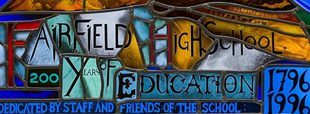Revision Support
Effective Revision Strategies
Being able to revise effectively is a skill that needs to be learnt and practised. At Fairfield we share effective revision strategies and resources with pupils in lessons, form time, assemblies and in bespoke revision advice sessions. The single most effective revision strategy is retrieval practice. Retrieval practice means trying to recall information from your memory instead of just copying out or reading notes. Each time information is recalled it strengthens the memory. To do this, pupils can use a variety of techniques such as flash cards, quiz questions and past exam questions and papers. It is incredibly simple but also incredibly effective. The three documents below give further guidance on effective revision strategies.
|
|
Fairfield Top Five Revision Tips Presentation
|
|
|
Effective Revision Habits and Strategies
|
|
|
Six Strategies for Effective Learning
|
Revision Timetable
Effective revision timetables are essential to plan a schedule of revision. The aim is to avoid completing a whole day of revision on one subject. Ideally revision sessions should be planned in blocks of 30 minutes with specific revision tasks to complete. It is better to break a subject up into blocks to revise over a number of days. The blank revision timetable below can be used to create a fortnightly revision schedule.
|
|
Blank Revision Timetable
|
|
|
Y7-8 Blank Revision Timetable – Autumn 2023
|
Advice for Parents and Carers
The two guides below from Tassomai and Elevate Education cover advice on wellbeing, mental health, supporting pupils with English, Maths and Science, top revision tips, supporting pupils with motivation and revision timetables, avoiding technological distractions, building resilience and overcoming stress.
|
|
Tassomai GCSE Survival Guide
|
|
|
Elevate Education Parent Booklet
|
Mental Health and Wellbeing
For young people coping with the pressures of GCSE exams is a challenge for their mental health and wellbeing. At Fairfield we support pupils every step of the way with advice and guidance in form time, assemblies, Life Skills lesson, and through the work of our Pastoral team. Ofqual have published excellent guidance on coping with exam pressure and the mental health charity YoungMinds have produced guidance on how to overcome the pressure to succeed. There are two further guides on the importance of sleep in supporting mental health and wellbeing.
|
|
Coping with Exam Pressure – Ofqual
|
|
|
Overcome the Pressure to Succeed – Young Minds
|
|
|
The Importance of Sleep – Mind Mate
|
|
|
Sleep – Advice for Parents and Children
|
|
|
Exams, Stress and Anxiety – GMCA and NHS
|
Year 10 and 11 Curriculum Evenings
In September we hosted Year 10 and Year 11 Curriculum Evenings to give parents and carers information and advice regarding the English, Mathematics and Science curriculums, effective revision strategies, important GCSE exam and Vocational qualification information, assessment updates and lots of other updates about the year ahead. The presentation documents for both evenings can be found below.
|
|
Year 10 Curriculum Evening 2023 Presentation
|
|
|
Year 11 Curriculum Evening 2023 Presentation
|
“An outstanding quality of education.”

Fairfield High School for Girls
Fairfield Avenue, Droylsden, Manchester, M43 6AB Email: admin@fairfieldhighschool.co.uk Tel: 0161 370 1488
Fairfield Avenue, Droylsden, Manchester, M43 6AB Email: admin@fairfieldhighschool.co.uk Tel: 0161 370 1488
Fairfield High School for Girls is an Academy Trust. The Trust is a limited company registered in England and Wales. Company number 07511610, Data Protection Registration Number Z2574365.




